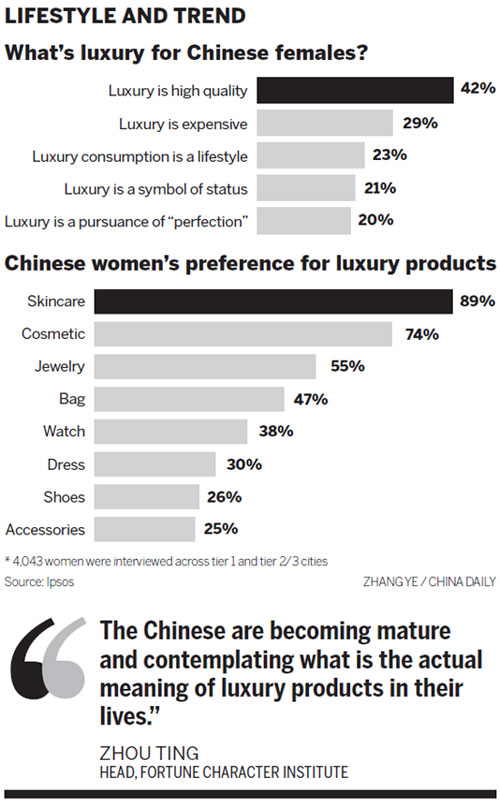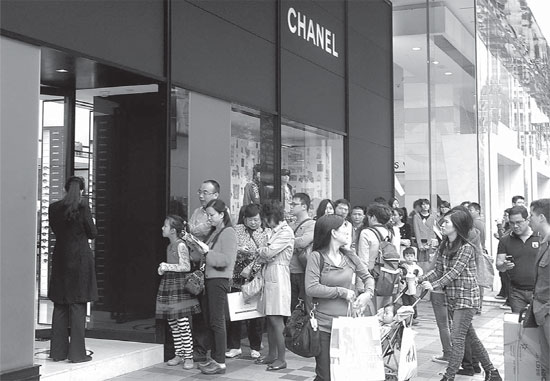No let-up in lure of luxury lines
Updated: 2013-02-25 05:55
By Liu Jie (China Daily)
|
||||||||
|
People lining up outside a Chanel outlet in Hong Kong. According to a report conducted by France-based market research company Ipsos, nearly half of Chinese urban women intend to buy luxury goods and more than 60 percent plan to buy bags, dresses, shoes, accessories and jewelry. Provided to China Daily |
But customers are now more likely to question the real value of brands
Wan Minmin bought a small Prada Saffiano bag as a Spring Festival gift to herself costing nearly 15,000 yuan ($2,401).
"It's a reward for my whole year's hard work. It's worthy," said the 30-year-old Beijing woman, adding that she plans to buy a Return to Tiffany necklace on her birthday in August.
Wan is among millions of Chinese females who still want to buy luxury items in 2013 despite rising luxury goods prices in China.
According to a report conducted by France-based market research company Ipsos, nearly half of Chinese urban women intend to buy luxury goods and more than 60 percent plan to buy bags, dresses, shoes, accessories and jewelry.
The survey, conducted during last August to October, covered 30 first to fifth-tier cities and surveyed 4,043 20- to 45-year-old women on their buying habits, relationships with brands, lifestyle, values and attitudes. The average monthly household income of these women was 15,925 yuan.
It showed that 43 percent of the respondents intend to buy some luxury products in 2013. Bags, dresses, shoes and accessories are the most popular, with 68 percent planning to buy them. A total of 66 percent want jewelry.
Wan said she believes luxury bags and jewelry reflect high quality, good lifestyle and the pursuit of perfection to her. "I especially prefer them to other classical or iconic series produced by luxury brands," she said.
Concerning the question regarding what luxury meant to a Chinese female, 42 percent of the respondents said it is high quality, 29 percent said it is expensive, 23 percent said denoted a certain lifestyle and 21 percent said it is a symbol of status.
"The Chinese are becoming mature and contemplating what is the actual meaning of luxury products in their lives," said Zhou Ting, head of the Fortune Character Institute, an organization that studies luxury purchases in China.
In another Ipsos' report, the international research firm found that Chinese women's motivation when buying luxury brands was establishing their own individual style. A total of 42 percent of the respondents - 66,000 females aged between 12 and 64 in 88 cities and rural areas - chose individuality as the primary motivation when buying luxury goods.
Other important motivations include having a sense of belonging to a group, with 19 percent selecting group sociability. As many as 21 percent said one of the motivations is pursuit of stability - avoiding risks, ensuring quality and seeking stability and comfort. Nineteen percent said keeping abreast of fashion and not being satisfied with the status quo, hunger for change and indulging themselves were also important considerations.
In other words, in China, 60 percent of the purchase of luxury brands derived from a motivation to show off as individuals and flaunt their buying power and choices, said Jessica Liu, research director of Ipsos MediaCT in Greater China.
Shopping ambitions are supported by growing wealth accumulation in China. Ipsos said the number of high-net-worth individuals - those with liquid assets of more than 6 million yuan - in China doubled from 2008 to 2011. Currently there are approximately 2.7 million such people in China, with 630,000 of them having liquid assets of more than 100 million yuan.
Chinese women are becoming more shrewd, using diversified channels to purchase luxury products.
In 2012, China's luxury goods consumption reached $46 billion, of which $27.1 billion was spent overseas. That can be attributed to high taxes on luxury goods in China, more overseas travel by Chinese people, various sales promotions in overseas markets as well as developed and convenient e-commerce, said Zhou.
During last year, a large part of the surveyed 4,043 Chinese mainland citizens had traveled overseas. Most of them chose Asia. Hong Kong was the most popular destination for mainland people: It was chosen by 70 percent of those surveyed. The second choice was Europe, then the United States.
Statistics from the China National Tourism Administration show that during the week-long Spring Festival (starting from Feb 9), 4 million Chinese traveled abroad, 90 percent of them headed to Asian destinations, including Thailand, Singapore and South Korea.
However, US officials say Chinese tourists now represent the fastest-growing visiting group with numbers expected to double within the next three years.
Given the depreciation of the euro and the US dollar, more Chinese people are expected to travel to destinations using those currencies or ones pegged to them in 2013 and over the coming years, said Zhou.
Wan said she had so far only traveled overseas to Thailand and Hong Kong and expects to visit the US this summer. "I have heard the reduction in prices of luxury goods is rather huge at the end of every season and special festivals," she said, adding that she hopes to buy a Tiffany necklace there, the home of the luxury jewelry brand.
liujie@chinadaily.com.cn

(China Daily 02/25/2013 page14)

 In Photos: 7.0-magnitude quake hits Sichuan
In Photos: 7.0-magnitude quake hits Sichuan
 Li Na on Time cover, makes influential 100 list
Li Na on Time cover, makes influential 100 list
 FBI releases photos of 2 Boston bombings suspects
FBI releases photos of 2 Boston bombings suspects
 World's wackiest hairstyles
World's wackiest hairstyles
 Sandstorms strike Northwest China
Sandstorms strike Northwest China
 Never-seen photos of Madonna on display
Never-seen photos of Madonna on display
 H7N9 outbreak linked to waterfowl migration
H7N9 outbreak linked to waterfowl migration
 Dozens feared dead in Texas plant blast
Dozens feared dead in Texas plant blast
Most Viewed
Editor's Picks

|

|

|

|

|

|
Today's Top News
Live report: 7.0-magnitude quake hits Sichuan, heavy casualties feared
Boston suspect cornered on boat
Cross-talk artist helps to spread the word
'Green' awareness levels drop in Beijing
Palace Museum spruces up
First couple on Time's list of most influential
H7N9 flu transmission studied
Trading channels 'need to broaden'
US Weekly

|

|








